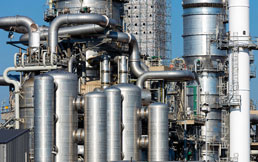Refinery / API
Mechanical upsets and the resulting downtime may incur huge economic losses for a refinery as well as all the industries dependent on its petroleum products. Flexaseal understands the importance of quickly and effectively meeting the needs of this industry.

Industry Challenges
- Emission controls for VHAP
- Flashing hydrocarbons
- Toxic and flammable products and processes
- Abrasive-laden fluids
- High speeds
- High pressures
- Temperatures up to 800 ºF (430 ºC)
- Corrosive applications
Seal Solutions
Flexaseal Recommends
- API designs for industry compliance and plant safety.
- Hydraulically balanced designs to reduce face loading and the subsequent generated heat, allowing for higher pressure capabilities.
- Welded metal bellows design – has no dynamic elastomer to hang up in product.
- Metallurgy options available for high and low temperature usage.
- Heavy duty multi-spring designs (Style 58A).
- Multi-point injection arrangements to ensure maximum sealing face cooling.
- Primary and secondary sealing combinations for abrasive resistance and superior heat conductivity.
- Premium hard face option – Silicon carbide versus nickel bound tungsten carbide effectively seals abrasive, gritty and crystallizing applications.
- Antimony impregnated carbon – the thermal conductivity is almost double that of standard carbon grades. Antimony takes the place of standard carbon resins and won’t ‘bake out’ in higher temperatures. Antimony impregnated carbon also experiences less face distortion at higher pressures due to its higher compression strength.
- Heat treated welded metal bellows cores to handle higher temperature and pressure sealing needs.
- Grafoil packing is designed to withstand temperatures well above O-ring materials and complies with API 682 standard (ISO 21049).
- Dual seal designs are available to address emissions concerns and reverse pressure capabilities.
- Pumping rings maximize the flow of cooling fluid around seal faces to dissipate heat.
